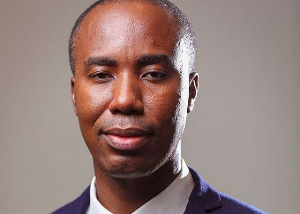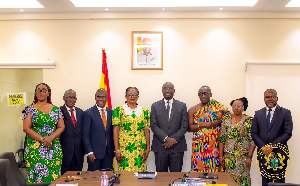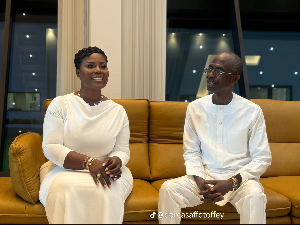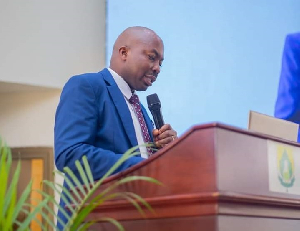West African Unity, Re-awakening that ancient dream
"When we think of West Africa and of Africa before we reflect upon our own countries, we are not just being pan-Africanists, we are being true nationalists.”
The wise words of Nana Addo Dankwa Akufo-Addo when he addressed an association of Nigerian lawyers in Abuja last Wednesday.
The view of the former Ghanaian Foreign Minister and probable next President is that anything that strengthens the viability of West Africa as a coherent, orderly and robust region will strengthen the domestic capacities and prosperity within each of our countries for our local populations and varied constituents.
On Thursday, March 13, when he outlined his vision for Ghana, Nana Akufo-Addo mentioned four main thematic areas: (i) continued consolidation of democracy (ii) transformation of the Ghanaian economy (iii) modernisation of society (iv) and Ghana's full participation in both the regional and continental integration project.
The processes of globalisation have certainly created the conditions which have made the Pan-African project real today.
The common view is that Kwame Nkrumah was a Pan-African visionary. He was pushing for African unity at a pace that his contemporaries could not fathom.
Today, the saying is that Nkrumah has been vindicated. Qanawu begs to differ. A visionary is not a man who seeks to achieve the improbable at the wrong time and fails. The fact that the very thing he sought to achieve is now being seen as probable defeats the generous tag that has been hitherto accorded him.
In SKB Asante's 2007 J B Danquah Memorial Lectures, he reminded us of an episode. Danquah confronted Nkrumah when Danquah met the Working Committee of the UGCC on 29 December 1947 for confirmation of Nkrumah’s appointment as general secretary of the UGCC. Dr Danquah said, “This is a Gold Coast national movement” and not a “West African movement; to bring all these people together is not an easy thing. We want to concentrate on making the Gold Coast a nation to serve as the base for launching the liberation of the rest of West Africa. Are you prepared to accept our policy.”
This did not make Danquah less a Pan-Africanist or integrationist. Unlike Nkrumah, Danquah had the foresight to see the wider objective of West African unity as being better fulfilled by making Ghana work.
In West Africa, regional integration must be pushed to the top as the guiding inspiration, shaping our various current projects of nation-building. There is at least one obvious historical antecedent for this trend: in the early parts of the twentieth century, the quest for regional integration was inextricably linked to the nationalist drives for independence. In 1953 when Kwame Nkrumah declared the unification of West Africa as his “basic personal philosophy,” he was speaking in the context of a foundation that was laid down decades before.
It was West Africa that provided the continent’s original venue for the outdooring of Pan-Africanist consciousness. Another great figurehead in our shared heritage of ideas is the Liberian Edward Wilmot Blyden, often regarded as the ideological uncle, if not the very father, of West African unity. Since his death in 1912, the concept of African unity has always being linked to the continent’s nationalist movements.
Blyden’s heir, the Ghanaian Joseph Ephraim Casely Hayford, had no problem in weaving the concept of a 'United West Africa’ into his advocacy for Ghana’s earliest expressions of nationalism. In 1926, Joseph Boakye Danquah was a powerful opinion leader as the publisher of the major newspaper for the West African Students Union in London.
He was of the view that West Africa was in pole position to be the torch bearer for the future progress and prosperity of Africa. But, like the practical visionary that he was, his approach was a systematic one that was both ambitious and realistic.
Danquah saw West Africa as bearing the greatest burden of responsibility for the future of Africa for the simple and practical reason that far more politically astute consciousness and intellectual power was based here than could be found in either Eastern or Southern Africa during his generation.
In December 2 of that year 1926, Dr. Danquah wrote, and I quote, “you cannot make a nation of Africa [except] by securing unity in West Africa...” Danquah saw regionalism as a more effective, practical way of achieving unity for the continent and that the strength of that regionalism would lie on the viability of its parts. Hence, his focus on Ghana as a launching pad.
“[B]y securing unity in West Africa, and by securing African rights in the Western portion, you thereby raise the general standard of African welfare and lay down an ideal of life which the African in East and South will strive to realise,” Danquah said. SKB Asante observes, “Like Casely Hayford, Danquah argued that if Africans were to survive, West Africa must become a nation and that it might unite under the sentiment of national progress.”
The time has never been this ripe since our post-independence leaders dreamed of African unity. Between January 1956 and the end of 1985 there were sixty successful coups in Africa, that is, an average of two every year. In 1966, the year that Ghana’s First Republic made its exit, there were eight military coup d’etat in Africa.
Today, democracy, however currently flawed in some jurisdictions, is increasingly the norm. Akufo-Addo is among a new crop of leaders who believe that the integration project which generation after generation of Africans have long cherished should no longer remain an elusive goal.
And, when he warned against “half-hearted” commitment to this, he was calling for bountiful political will that we know never actually existed. A typical example was the long delay to implement the 1980 Lagos Plan of Action, which envisioned the regional blocs as the most effective way of achieving integration.
Also, some current leaders may still not be viewing their nationalistic actions in the context of the collective; what Akufo-Addo describes as thinking West African should be synonymous to thinking Nigerian, Ghanaian or Ivorian.
So for example, when he tells Nigerians to imagine what their $2 billion annual salt budget can do for Ghana, he is wondering why they rely on far away Brazil for a product that Ghana can supply to Nigeria in abundance if only, first, Ghana can sort out its salt industry and, second, it can get Nigeria to look nowhere else.
Experts have recognised two obstacles preventing Africa from entering the phase of self-reliant development: irrational fragmentation from a casual tearing up of the continent into incoherent real estates of the Africans and dependence on donors to finance African development.
The expectation is for African economies to grow from 7% to 10% annually to make that necessary leap. We are not there yet. Ghana is yet to breach the 7% historical mark. In the twentieth century, 1958 to be precise, Nkrumah said, “in the last century ... the Europeans discovered Africa: in the next century the Africans will discover Africa.” That century, ladies and gentlemen, is now.
Henry Sylvester Williams was the creator of the Pan-African Movement in 1900, it was W.E.B. Du Bois whose consistent activity kept it alive and developing to the point where in 1945 it could become the launch-pad for the African Independence Movement.
Until the 1990s, most African countries were under military or one-party rule. Those were the days when our leaders could make grand promises at regional or continental summits and get away with it when they do nothing to implement them.
Civil society organisations are in a much stronger position to demand that their leaders keep their promises. Africans today understand better than ever before that our small economies can only improve and compete if we allow free movements of people, goods, services, culture, arts, skills and knowledge through our borders. We appreciate better the factors that suffocated the integration dream.
When Akufo-Addo went to Lagos/Abuja last week, he had to change cedis to American dollars before changing it into naira. So what is stopping us from allowing a direct exchange of our currencies? As one expert put it, “[t]he existing state currencies that are not exchanged directly with each other, and whose exchange rate is mediated with the dollar, the franc and the Euro, should give way to direct exchanges based on a fair settlement of the appropriate par value.”
The irony is that it was only during colonial times that we managed a system of common currency across borders. The British created the West African pound. They also created but a not-so-successful East African Currency Board in 1919 and issued a common currency unit, the East African Shilling, as legal tender in Kenya, Tanganyika and Uganda. After independence in the 1960s, the common currency area broke apart. Efforts to mend the break up are still continuing with the re-establishment of the East African Community.
In addition during the 1920s the then independent Republic of South Africa collaborated with the colonial powers to create a common monetary area. The Common Monetary Area embraced South Africa, former British colonies Botswana, Lesotho and Swaziland and the then German colony, Namibia.
But, the most successful single currency was in fact thought of in 1946 and brought to being in 1948 - the CFA. The exchange rate between the ‘CFA francs’ of the West African Monetary Union and the Central African Monetary Area have allowed capital to move freely between the two regions through the ‘African Financial Community.’ Sadly, even with the CFA zones, each currency is only legal tender in its own region, despite the currencies being jointly managed by the French Treasury as integral parts of a single monetary union.
President Abdelaziz Bouteflika of Algeria has articulated two particular “virtues” of regional economic integration. Integration, he points out, makes huge investments for specific projects possible, “reinforcing the attractiveness of our economies and reducing the risks.” Also, integration can make the costs of infrastructural development cheaper.
The general view is that none of the states in post-colonial Africa is economically, socially, culturally and politically standing steady, holding its own and making the sort of progress one could describe seriously as developmental.
So we must integrate. Yet, despite the dismantling of tariffs and other trade barriers, commerce between West African countries, for instance, has not increased significantly.
And, this is where Akufo-Addo’s second thematic area comes in. We must make a more committed effort at transforming our economies from exporters of primary commodities to the developed countries, and importers of finished products from outside the continent.
Thus, you may allow the concept of free movement of people, goods and services to work, but its impact can only be massively felt when African economies develop a strong capacity to produce more manufactured goods and at a standard that could be traded to neighbouring countries.
Nana Akufo-Addo was right in observing that Ghanaians and Nigerians care about each other very much, and for reasons that carry each of us beyond the concerns of daily domestic preoccupations.
Our respective histories can be said to epitomise the whole of the African experience over the last two centuries if not longer: historically we have remained separate states with different languages and cultures; and yet we have been forced together in a class of colonial entities since the Berlin Partition of Africa in 1885.
After independence, the progress of both countries has laboured under serial military dictatorships, bad governance practices, bad economic management policies, poor implementation procedures and the suppression of individual freedoms.
Today Nigeria, like Ghana, enjoys a renewal of determination, busy as it is to consolidate its constitutional democracy. The two countries are walking in parallel along respective paths of progress, facing different particular challenges but with a shared sense of realistic confidence never seen before.
On this journey, we often use the positive lilt in each other’s stride to re-affirm our commitments to our latest respective ventures in nation-building - because conceptually in many ways Nigeria and Ghana are standing side by side, our populations walking on both the sunny and shady side of the same roads.
In subscribing diligently, explicitly and conscientiously to those values of democracy, rule of law, human rights, free movements of people, goods and services, we can begin to build up the power of Africa as an economic and peaceful, self disciplined and cooperative community, a force of reason and initiative to be reckoned with and emulated in the global arena.
Let us raise West Africa in the global arena on the shoulders of Ghana and Nigeria, for in so doing, we shall overcome our common challengers and agents of indifference, of potential exploitation of our people!
Source: Qanawu Gabby, Statesman columnist - the author is Gabby Asare Otchere-Darko, former Editor-in-Chief of The Statesman, and Executive Director of the Danquah Institute















